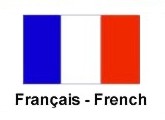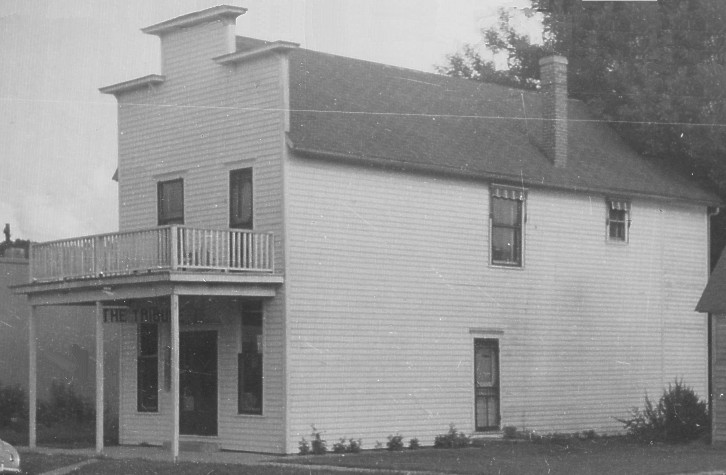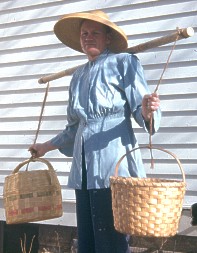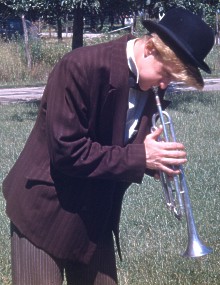Office of the Morganville Tribune operated by Agnes Huff after her husband's 1938 death
The September 2 edition of the Morganville Tribune had many articles about the pageant. In one of them, editor Agnes Huff provided an overview of what happened that evening.
Historical Pageant A Success
The presentation of the Historical Pageant, sponsored by the UNESCO, Friday night was a success. By a conservative estimate, 2,000 people attended and over 1,000 were seated in the Stadium. Many stood and some were unable to see. It was a happy crowd that milled around and patronized the booths.
Colored lights were used to emphasize the colors on the costumes. The author began the story of Morganville with a
beautiful descriptive story of the virgin prairies. Then the Indians moved onto the stage. Later, the arrival of the
three families known as the first settlers, just after the Civil War, the Silvers, Millers and Andersons. Some of their
children were present to represent them. Then Capt. and Mrs. Ebenezer Morgan of New London, Conn., for whom Morganville
was named, entered the story. The pageant was a story of their lives.
Other settlers came from many other lands and they were represented by their descendants or volunteers who played their
parts. Peoples from Asia, Europe and the Orient were represented and their story was told with music, dance, song,
costume or some custom that was typical of them. The American cowboys were there in costume and sang the cowboy songs.
The 4-H Girls and Boy Scouts were shown. A scout with the American flag with the spot-light on it made a beautiful
scene at one time.
After the years of hardship, the years of plenty were shown and the idea of sharing with our adopted town of Feves,
France, was exemplified by contrasting our full basket of food with the empty basket of the needy overseas. The World
Wars entered the picture. With the French group was a French girl and an American Doughboy of the first World War. At
the conclusion of the scene of the second World War, Rev. E. H. [sic H. E.] Millikan, a chaplain over seas, gave the benediction.
Mrs. G. I. Bodine and Miss Alice McLavy, both over eighty years, represented the women of the church. A Sunday School
girl and a singer completed the scene. Mrs. Viola Pettey Carson represented the early day school teacher.
After the wars, motherhood was pictured, turning the globe, searching for her lost children - those who did not return.
The story of hardship was told to show the village of Feves that hardship was met and overcome before we had plenty,
and they too will win.
The soloists for the evening were: Lyle Bloom who sang the "Star Spangled Banner," Midn. Ivan Roenigk sang “The
Marseillaise," the national anthem of France, Lennea Oetinger, a Russian dance, and Mrs. Wm Silver sang "Madame
Butterfly" in a Japanese scene.
J. K. Walter, president of the County UNESCO, read a few telegrams and introduced Robt. Sonkin of New York City, a
representative of Operation Democracy, who spoke to the audience. Mr. Sonkin took a recording of the pageant which
will be broadcast over station WRUL at New York.
The script was written by Velma Carson. Velma Hahn Young directed the pageant and conducted the orchestra. Mrs. S. A.
Anderson was the reader.
At this time, we wish to say it is impossible to give credit to all who helped prepare the pageant or describe any
scene or group of actors - all worked hard and all were good. We know it was a success and wish all who wished to
see it had been able to. It would take a book to tell of the evening's entertainment. All helped, some in many ways.
In fact, the community seemed to just have one thought and that was to make a success of the evening and they did just
that.
Mrs. H. L. Oetinger was chairman of the ice cream booth, which also sold cake and ice cream. Mrs. Herbert Nelson was
chairman of the cookie booth; Ronald Allen, the penny throw and Mrs. Donald Carpenter, the fortune telling booth. Then
there was the milk can, representing the need of French children, which yielded $225 when the evening was over, and
the bingo stand; Vance Carson's pony, an old army horse, added $10 to the fund by rides for the children at 10 cents
per ride.
The old-fashioned dance with Orb Pierson and orchestra played for the old-fashioned dance which lasted long after midnight.




